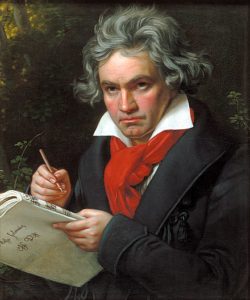By Eileen Wingard


SAN DIEGO –– Although we hear it only near the end of Hershey Felder, Beethoven, the letter Beethoven wrote to his younger brother, Johann, at the age of 31, known as the Heiligenstadt Testament, summarized his struggles with handicaps and tragedy that drove the composer to consider giving up on life. His despondency, however, was countered by his strong determination to persist because of the music he still had to write, the creative ideas still in his head that needed completion.
As Holocaust survivor Victor Frankl pointed out in his book, Man’s Search for Meaning, the ones who survived were not the strongest or the brightest, but those who had meaningful goals in their lives, those who had the fierce desire to carry out a purpose. So it was with Beethoven, who, at 31, was rapidly losing his hearing, the most essential of the five senses for a musician, yet managed, through his innate talent and vast imagination, to continue composing music.
Felder inserts some of Beethoven’s most poignant compositions throughout his drama, beginning with a set of variations in C minor–his favorite key–which the master wrote at the tender age of eleven. It served to further the narrative, even when telling of the terrible abuse Beethoven suffered from his monstrous drunken father.
Although Beethoven wrote “dolce” meaning “sweet,” more often than any other composer, he also, by stretching and breaking rules, inserted more conflict and sadness into his music. His goal was not just beauty, but human feelings, thus ushering in the Romantic Era.
During the 90-minute run of the play, we hear the fleet-fingered Felder perform sections of the “Moonlight” Sonata, the “Appassionata” Sonata, the “Pathetique,” Sonata, a piano version of the first movement of his Fifth Symphony and a lovely rendition of Beethoven’s most familiar piano piece, “Fuer Elise,” which we learn, was discovered after the master’s death. Felder’s playing is so expressively nuanced and so technically adept that one might wish someday, to hear him perform a full piano recital, or perhaps a concerto with a symphony orchestra.
As with all of his one-man plays, Felder informs us about many interesting details of the composer’s life, this time, using the voice of Gerhard Von Breuning, a doctor, whose father was the composer’s friend. Gerhard, at the age of twelve, took piano lessons from the master during Beethoven’s final years. Breuning paints a picture of Beethoven as a disheveled man, living in a cluttered, filthy apartment and aggravated by his nephew, Karl, of whom he took custody when the composer’s younger brother died.
Felder manages to insert humor into the play, as we learn of Beethoven’s tricks to get invited to dinner, and his habit of always showing up late.
Hershey Felder, Beethoven is a captivating drama with some comic relief, taking place in the shadow of the graveyard with Beethoven’s tomb. It begins and ends with the issue of where to intern Beethoven’s remains.
What does remain are the treasured compositions Beethoven has left, and the added riches of Hershey Felder illuminating the humanity and the music of this monumental figure.
Hershey Felder, Beethoven continues at the San Diego Repertory Theatre, Lyceum Theatre through March 24.
*
Wingard, a retired violinist with the San Diego Symphony, is a freelance writer specializing in coverage of the arts. She may be contacted via eileen.wingard@sdjewishworld.com
Nicely written, Eileen. I’m glad we could see it together.